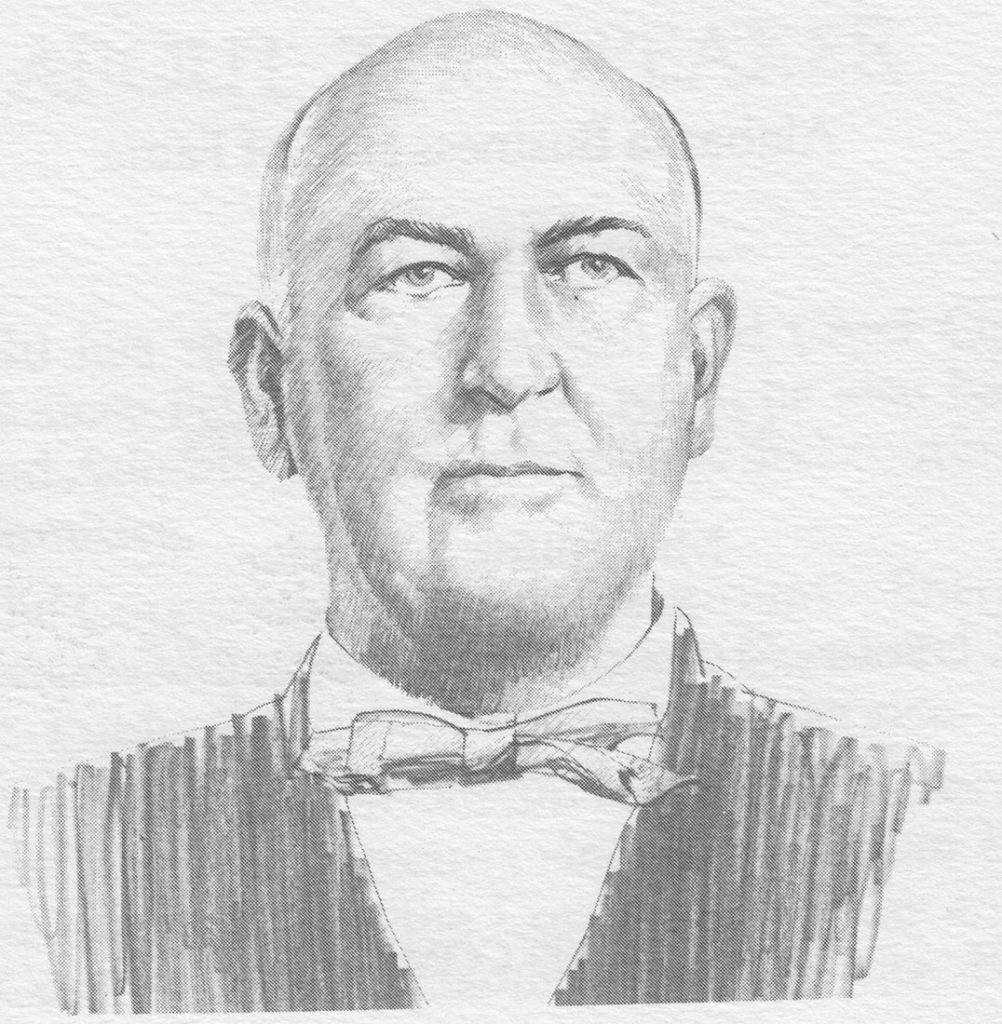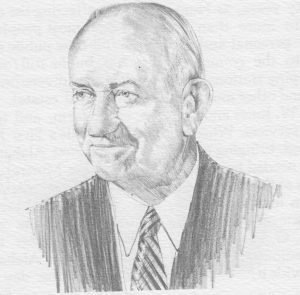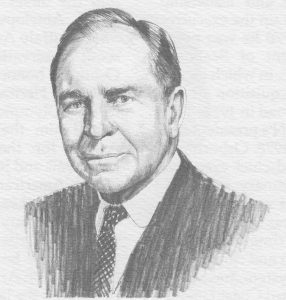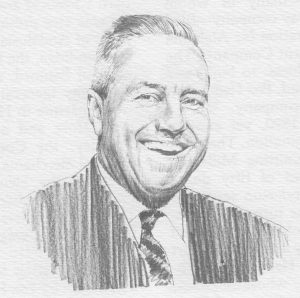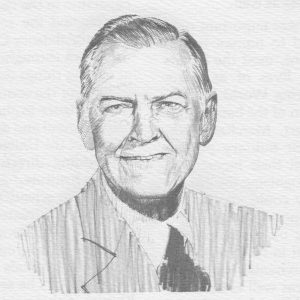Fox Henderson; noted the Troy Messenger in 1918, “was a born leader of men,” a man who possessed “attributes that would have made him a success in any field of endeavor he might have undertaken.” His principal characteristics, the paper noted, were energy, willpower and determination,” and “the intuitive judgment to use his talents to the best advantage.” Those characteristics were to benefit not only Henderson and his family, but the city of Troy, and indeed all of the people of Southeast Alabama, for during the decades before and after the turn of the century, Fox Henderson built a varied and extremely successful network of businesses and industries that strengthened the economy of his region and brought new hope to many of its inhabitants.
Born in Pike County, Alabama, in 1853, the oldest son of Jeremiah Augustus Henderson and Mildred Elizabeth (Hill) Henderson Fox Henderson moved with his family to the county seat of Troy in 1869 when his father opened a mercantile business there. Young Henderson and his brother Clem joined their father in the prospering business, and in 1881, the brothers expanded their financial, holdings by purchasing the Pike County Bank, a still struggling operation that had been in business only four years. With Fox Henderson as president, the brothers changed the institution’s name to Farmers Merchants Bank and moved the facility to new quarters. Alabama, and as its reputation for reliability spread throughout Pike County, the institution’s assets grew. “The personality of Fox Henderson,” one local reporter noted, “and the confidence and trust which the citizens of this section held for his ability and dependability were enough in itself to bring the institution increasing renown.” The Henderson brothers operated Farmers & For twenty years after its founding, Farmers & Merchants was the only financial institution in that section of Merchant’s as a private bank until 1898, when they received a state charter. Such was the growth and development of the firm’s business, however, that the board of directors decided in 1902 to expand their operations, and Farmers & Merchants became Farmers & Merchants National Bank that same year.
Banking, however, was far from Fox Henderson’s sole interest. In 1880, a year before he and his brother purchased the bank, Henderson became a partner in Michener, Henderson & Company, makers of spokes, handles, and picker sticks. Some twenty years later, the firm’s 125 employees were producing 15,000 spokes, 500,000 handles and 640,000 picker sticks a year. And they made other products too, such as a gigantic special-order cart constructed in 1902 for a mill in Goshen. “The wheels of the cart,” reported the Troy Messenger, “are ten feet high and thirty feet in circumference. The tires are nearly one-half-inch thick and almost six inches wide.”
Willing to think in expansive terms and always open to new business ventures that might bring needed capital to the area, Henderson spotted another opportunity in 1887, when Alabama Midland Railway Company was organized to build a railroad from Montgomery, to Troy, to Chattahoochee, Florida. On the same day that Alabama Midland was incorporated, Fox Henderson and others – many of whom were officers in the railway company – filed a declaration of incorporation for Alabama Terminal and Improvement Company. The purpose of the new business: to build and equip the proposed railroad. Fox Henderson served as treasurer of the company.
Three years later, in 1890, yet another venture captured his imagination. That year he opened Henderson Knitting Mills, an operation with an output of fifty dozen garments a day. Fox Henderson served as secretary-treasurer. By the turn of the century, he had become one of the largest landowners in a several-county area, and on part of his 6000-acre holdings, Henderson established the Arcadia Dairy, whose imported Jersey cows supplied the citizens of Troy with fresh milk and butter daily. Henderson then turned his attention to the shortage of fertilizer in the area. Although Troy already had a large fertilizer mill, the demand for its products was such that the county still had to import several thousand tons a year. Convinced that the market could support another mill and that its successful operation could establish Troy as an exporter of fertilizer, Henderson forged ahead as he had on many occasions before. The Standard Chemical and Oil Company that he founded became the largest plant of its kind in Alabama. By 1918, the 300 employees in the feed mill and chemical plant were handling 8000 tons of peanuts and producing 38,000 tons of crushed phosphate rock and 75,000 tons of fertilizer annually.
Henderson’s business and industrial interests had become so complex by 1911 that he formed a holding company and took his children in as partners, consolidating his own holdings and theirs for central operation. By providing financing for institutions throughout South Alabama and by backing many of the leading corporations in the area, Fox Henderson & Sons became widely known in Alabama for its progressive policies and its reliability as a financial institution. The scope of Henderson’s own business affairs was revealed in a 1911 pamphlet published by the firm. In that year, Henderson held the following offices: He was president of the First National Bank of Dozier’s, the First National Bank of Luverne, Farmers & Merchants National Bank of Troy, Henderson National Bank of Huntsville, the First National Bank of Brantley, and Standard Chemical and Oil Company of Troy. He was vice president of the First National Bank of Andalusia, the First National Bank of Brundidge, the Henderson Lumber Company of Sanford, and the Planters Trading Company (general merchants) of Elba. He was a partner in Henderson & Hill (department store and advancing merchants) of Brantley, the Cody-Henderson Company (general merchants, livestock, fertilizers) of Luverne, the Henderson-Black Company (importers, jobbers, and distributors) of Troy, and Henderson Live Stock Company (mules, horses, wagons, buggies, harness) of Troy.
The reputation for sound business dealings begun by Fox Henderson, Sr. was to be continued by the sons. “Fox Henderson & Sons,” noted the Troy Messenger in the early 1930s, “through its farsighted and constructive activities, has built the largest and strongest financial institution in Southeast Alabama and one that is reputed to be among the most stable in the entire South.” In civic affairs, also, Fox Henderson took a leading hand. When his congregation needed laborers to build a new church or when his Masonic Lodge needed a lot on which to construct a hospital, Henderson supplied them, and he donated his time and his resources to many other public endeavors as well.
Henderson’s death in 1918, following a long illness, was mourned throughout South Alabama by his family, friends, business associate, and many others who understood what his leadership had meant to the region. He was remembered b them as a quiet, determined man who never sought the limelight and who never spoke unkindly of his fellow man. He was remembered as an inventive and courageous pioneer in the world of business and industry, whose confidence in the region’s future had inspired confidence in others. As more than one obituary noted, much of the progress and prosperity South Alabama had witnessed in the preceding decades had been due in no small measure to the vision and leadership of Fox Henderson. “He was a born leader of men,” it was said, and “he was a life out of the ordinary.”

